Mountain Bike Handlebars are a critical component often overlooked, yet they significantly impact your bike’s handling, your riding comfort, and overall performance on the trails. Upgrading your handlebars can be one of the most effective ways to personalize your ride and enhance your mountain biking experience. Whether you’re seeking improved control on technical descents, greater comfort during long rides, or simply want to shed some weight from your bike, choosing the right handlebar is essential.
This comprehensive guide dives deep into the world of mountain bike handlebars. We’ve rigorously tested a range of models, from high-end carbon fiber to budget-friendly aluminum, to bring you in-depth reviews and expert advice. We’ll explore the key considerations when selecting handlebars, including material, width, geometry, clamp diameter, and more, ensuring you have all the information you need to make the best choice for your riding style and needs.
Deity Components Speedway 35 Carbon Riser: Best Overall
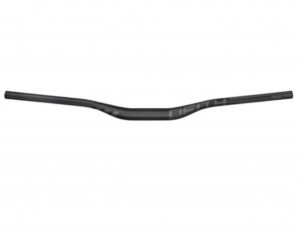 Deity Components Speedway 35 Carbon Riser mountain bike handlebar
Deity Components Speedway 35 Carbon Riser mountain bike handlebar
Price: $180 at Backcountry
Weight: 245 grams | Clamp Diameter: 35mm
Reasons to Buy:
- Exceptional vibration dampening for enhanced comfort
- Lightweight construction without sacrificing durability
- Modern geometry for optimal control and handling
- Premium finish and stylish aesthetics
Reasons to Avoid:
- Higher price point compared to aluminum options
- Limited to a single rise option
The Deity Speedway Carbon immediately impressed our testers with its balanced feel and superior performance. This handlebar stands out for its exceptional blend of modern design, lightweight construction, and remarkable vibration dampening capabilities. The 35mm clamp diameter, coupled with a meticulously engineered uni-directional carbon layup and a generous 810mm width, provides riders with confidence-inspiring control and precise handling in a wide range of riding scenarios.
Beyond its precision, the Speedway Carbon truly excels in rider comfort. Deity has expertly tuned the bar to effectively dampen vibrations and absorb trail chatter, minimizing hand fatigue without compromising responsiveness. Its geometry, featuring a 9-degree backsweep and 5-degree upsweep, contributes to a natural and comfortable hand position. The Speedway Carbon is available in a 35mm clamp, 30mm rise, and 810mm width configuration, with a matte black carbon finish and nine logo color options, allowing for personalization to match your bike’s aesthetics or other Deity components.
While the Speedway Carbon sits at a higher price point, typical of carbon fiber handlebars, its performance justifies the investment for riders seeking a top-tier upgrade. Although not the absolute lightest in our test group, its weight is competitive within the carbon handlebar category. The single rise option may not suit all riders, but for many trail, enduro, and even downhill applications, the Deity Speedway Carbon emerges as a truly outstanding handlebar that elevates the riding experience. For riders seeking a more budget-conscious carbon option, the OneUp Carbon Handlebar offers a lighter and more affordable alternative.
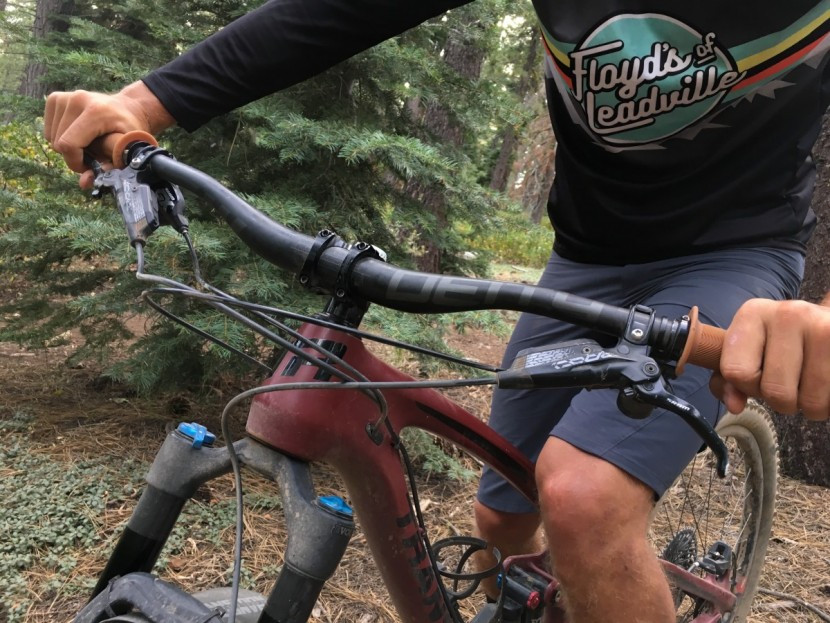 Deity Components Speedway 35 Carbon Riser mountain bike handlebar in action
Deity Components Speedway 35 Carbon Riser mountain bike handlebar in action
The Deity Speedway Carbon Riser handlebar is a significant upgrade, enhancing your bike’s cockpit with improved comfort and control.
Renthal Fatbar 35: Best Overall Aluminum Handlebar
 Renthal Fatbar 35 aluminum mountain bike handlebar
Renthal Fatbar 35 aluminum mountain bike handlebar
Price: $86 at Amazon, $94 at Backcountry
Weight: 311 grams | Clamp Diameter: 35mm
Reasons to Buy:
- Attractive price point for a high-quality handlebar
- Proven and reliable design with a strong reputation
- Durable aluminum construction built to withstand demanding trails
Reasons to Avoid:
- Heavier than carbon fiber handlebars
- Vibration dampening less effective compared to carbon
The Renthal Fatbar 35 is a legendary name in the world of handlebars, and the Fatbar 35 carries on this legacy as an exceptional aluminum mountain bike handlebar. Renthal’s expertise from the motocross world translates seamlessly to mountain biking, delivering a handlebar that is both robust and performance-oriented. The Fatbar 35, with its modern 35mm clamp diameter, provides a stiff and responsive front end feel, enhancing steering precision and control.
While constructed from aluminum, the Fatbar 35 does a commendable job of mitigating vibrations, offering a more comfortable ride than many other aluminum handlebars. Its reasonable price makes it an outstanding value proposition, providing a level of performance that rivals more expensive options. Renthal has expanded the Fatbar 35’s appeal with a black colorway, catering to riders who prefer a more understated look alongside their classic bronze finish. Offering versatility, the Fatbar is available in both 35mm and 31.8mm clamp diameters, and a range of rise options including 10mm, 20mm, 30mm, and 40mm, ensuring compatibility and fit for diverse rider preferences and bike setups.
Despite its impressive lightweight for an aluminum handlebar, the Fatbar 35 naturally carries a weight penalty compared to carbon fiber counterparts. While comfortable for an aluminum bar, it doesn’t quite reach the vibration-damping capabilities of top-rated carbon models like the Deity Speedway Carbon. However, the Renthal Fatbar 35 remains a significant performance upgrade for most riders, offering an excellent balance of performance, durability, and affordability. For riders prioritizing maximum vibration damping, carbon handlebars like the Deity Speedway Carbon remain the top choice.
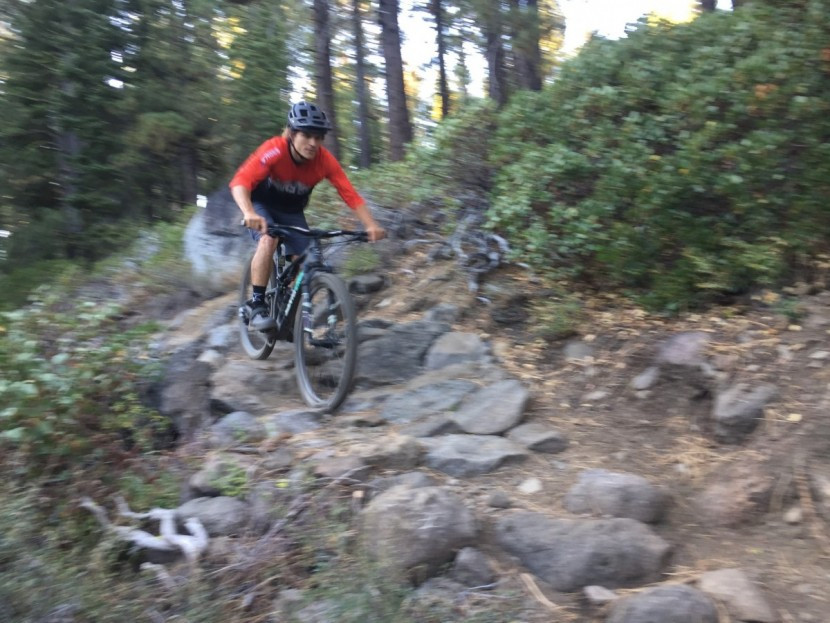 Renthal Fatbar 35 aluminum mountain bike handlebar on the trail
Renthal Fatbar 35 aluminum mountain bike handlebar on the trail
The Renthal Fatbar 35 provides excellent control and surprising vibration dampening for an aluminum mountain bike handlebar.
OneUp Components Carbon Handlebar: Best Bang for the Buck Carbon
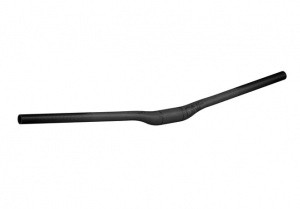 OneUp Components Carbon Handlebar
OneUp Components Carbon Handlebar
Price: $160 at REI, $160 at Backcountry
Weight: 223 grams | Clamp Diameter: 35mm
Reasons to Buy:
- Lightweight carbon construction for enhanced performance
- Excellent value for a carbon fiber handlebar
- Balanced ride feel, blending stiffness and compliance
- Superior vibration dampening for increased comfort
Reasons to Avoid:
- Exclusively available with a 35mm clamp diameter
OneUp Components has carved a niche for itself by producing high-performance mountain bike components at accessible prices, and their Carbon Handlebar exemplifies this philosophy. While it represents an investment beyond aluminum handlebars, it significantly undercuts the price of other carbon models in the market, making carbon fiber performance more attainable. Despite its straightforward name, the OneUp Carbon Handlebar is anything but basic, delivering a sophisticated design and exceptional on-trail feel.
The OneUp Carbon Handlebar is engineered for control, featuring a robust 35mm clamp diameter, an 800mm width, and a comfortable 8-degree backsweep and 5-degree upsweep. Unique to its design is an ovalized shape in the transition/taper zone, strategically implemented to enhance vertical compliance and maximize vibration absorption. This innovative approach results in a handlebar that is remarkably comfortable, effectively reducing hand fatigue without sacrificing responsiveness or steering precision. Our 20mm rise test bar weighed a mere 223 grams, with a minimal weight increase for the 35mm rise option. The handlebar sports a stealthy black carbon finish with subtle logos, and OneUp offers decal kits in various colors for riders seeking to personalize their setup.
The OneUp Carbon Handlebar, while offered in an 800mm width, includes convenient hash marks for easy trimming to a preferred size. Its sole clamp diameter option of 35mm may necessitate a stem upgrade for bikes with 31.8mm stems. However, for riders seeking a significant upgrade in comfort, control, and weight reduction without breaking the bank, the OneUp Carbon Handlebar stands out as an exceptional choice. For those on a tighter budget, the Funn Full-On offers an even more affordable option, available in both 31.8mm and 35mm clamp diameters.
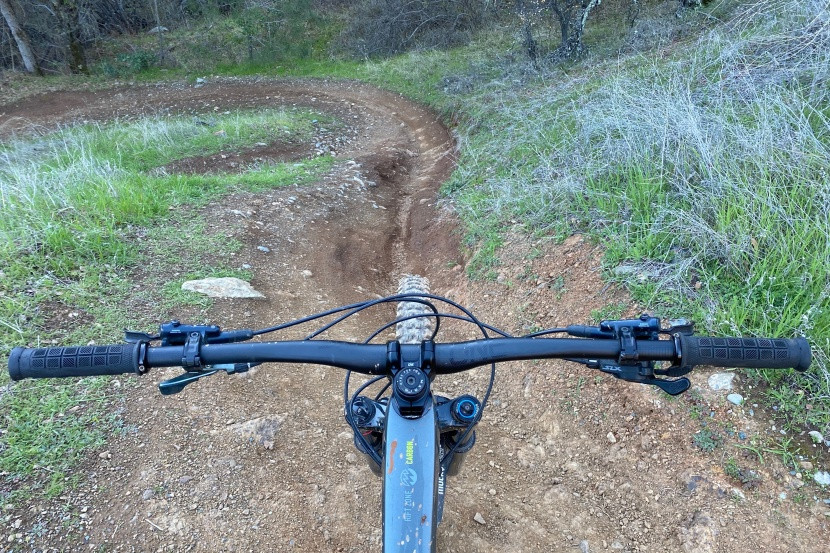 OneUp Components Carbon Handlebar praised for its value and performance
OneUp Components Carbon Handlebar praised for its value and performance
The OneUp Carbon Handlebar delivers an excellent combination of value, comfort, control, and aesthetics, making it a tester favorite.
Funn Full-On: Best on a Super Tight Budget
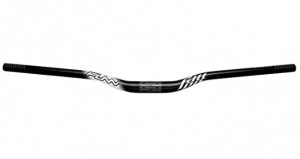 Funn Full-On aluminum mountain bike handlebar
Funn Full-On aluminum mountain bike handlebar
Price: $43 at Amazon
Weight: 335 grams | Clamp Diameter: 31.8mm
Reasons to Buy:
- Extremely affordable, offering exceptional value
- Available in a range of five colors to match your bike
- Offered in both 31.8mm and 35mm clamp diameters for versatility
Reasons to Avoid:
- Heavier compared to carbon and higher-end aluminum handlebars
- Graphics may be considered less subtle than competitors
- Ride feel less refined than more expensive options
For riders seeking a handlebar upgrade without a hefty price tag, the Funn Full-On mountain bike handlebars present an outstanding budget-friendly solution. Constructed from robust 6061 aluminum, these handlebars offer a significant performance improvement over stock handlebars commonly found on complete bike builds. The Full-On handlebar is notably stiff, translating to responsive handling and control, while still providing respectable trail feedback absorption. Our test bar featured a comfortable 5.5mm upsweep and 8mm backsweep, offering a familiar and agreeable feel. The Full-On is versatile, available in both 31.8mm (tested) and 35mm clamp diameters, 785mm and 810mm widths (31.8mm only), and 30mm, 15mm (tested), and 7mm rise options. For riders looking to add a touch of color to their bike, the Full-On is offered in five anodized colors: black, silver, orange, red, and blue.
Given its remarkably low price, the Full-On handlebar’s minor drawbacks are easily forgivable. Being an aluminum model, it is heavier than carbon fiber handlebars, weighing in at 335 grams for our 785mm wide, 15mm rise test bar. While it effectively dampens some trail vibrations, it doesn’t quite match the sophistication of higher-end aluminum and carbon models. The logo graphics are more prominent and may not appeal to all riders seeking a stealthier aesthetic. However, considering its price point, the Funn Full-On is unmatched in value and performance. For riders with a slightly larger budget aiming for weight reduction, the Race Face Next R 35 Carbon offers a lightweight alternative, albeit at a higher cost.
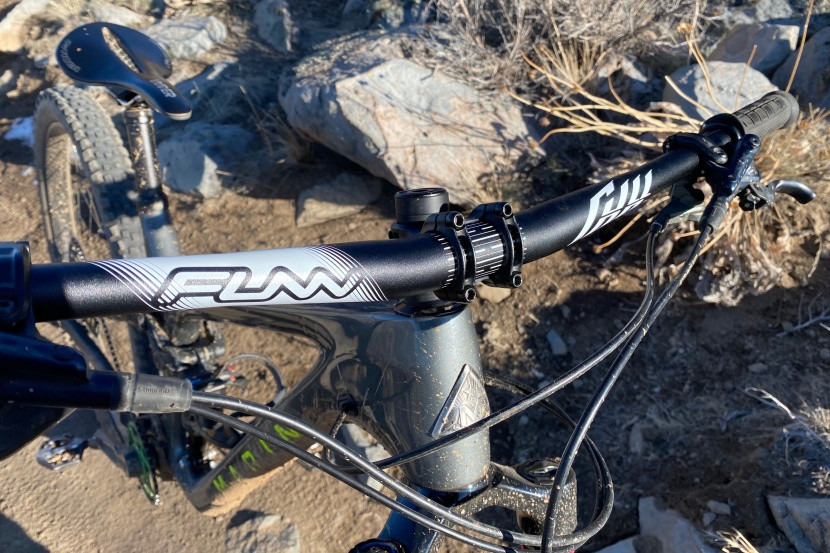 Funn Full-On handlebar offering exceptional performance at an unbeatable price
Funn Full-On handlebar offering exceptional performance at an unbeatable price
The Funn Full-On handlebar performs admirably on the trail, despite costing significantly less than other tested models.
Santa Cruz Bicycles Carbon 800 Riser: A Close Second
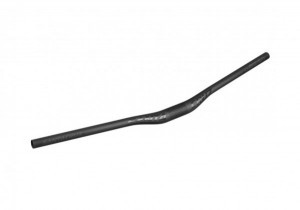 Santa Cruz Bicycles Carbon 800 Riser mountain bike handlebar
Santa Cruz Bicycles Carbon 800 Riser mountain bike handlebar
Price: See It at Santa Cruz Bicycles
Weight: 240 grams | Clamp Diameter: 35mm
Reasons to Buy:
- Excellent balance of stiffness and compliance for optimal control and comfort
- Lightweight carbon construction enhances bike performance
- Well-engineered and durable, reflecting Santa Cruz’s expertise
Reasons to Avoid:
- Higher price point, typical of carbon fiber handlebars
- Santa Cruz branding may not appeal to all riders aesthetically
The Santa Cruz Carbon Riser handlebar pleasantly surprised us, exceeding expectations for a house-branded component from a major bike manufacturer. Santa Cruz Bicycles, renowned for their high-quality frames and wheels, demonstrates their carbon fiber expertise in these handlebars. These handlebars are not merely an afterthought; they are thoughtfully designed, specced on high-end Santa Cruz complete bikes, and available as a premium aftermarket upgrade. The Carbon Riser stands out for its lightweight feel and stealthy aesthetics, coupled with a comfortable geometry featuring a 9mm backsweep, 5mm upsweep, and a 20mm rise, providing confidence on demanding trails. The handlebar delivers impressive stiffness for precise handling while also incorporating sufficient compliance to effectively dampen vibrations for all-day riding comfort. The Carbon Riser is offered in two widths: 800mm (tested) and 760mm.
While carbon handlebars generally come with a higher price tag, the Santa Cruz Carbon Riser is competitively priced within the carbon market and delivers tangible benefits in comfort and control. The Santa Cruz branding might be a point of personal preference, and the single 20mm rise option may not suit every rider’s ideal setup. Despite these minor considerations, the Carbon Riser handlebar is an excellent upgrade for any trail bike, offering a winning combination of lightweight design, precise handling, and effective vibration damping. For riders seeking more rise options, the aluminum Renthal Fatbar 35 is available in four different rises.
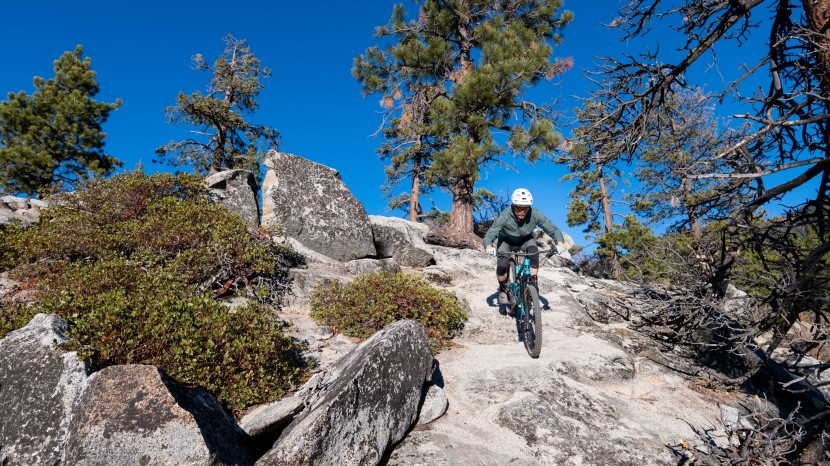 Santa Cruz Carbon Riser handlebar offering a balanced and lightweight ride
Santa Cruz Carbon Riser handlebar offering a balanced and lightweight ride
The Santa Cruz Carbon Riser handlebar is a lightweight and well-balanced option, enhancing the ride feel of any mountain bike.
SQlab 30X 12-Degree Carbon: Best for Extra Backsweep
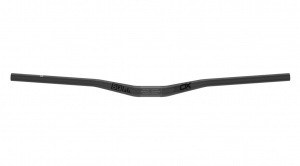 SQlab 30X 12-Degree Carbon mountain bike handlebar
SQlab 30X 12-Degree Carbon mountain bike handlebar
Price: $287 at Amazon
Weight: 235 grams | Clamp Diameter: 31.8mm
Reasons to Buy:
- Lightweight carbon construction for performance and comfort
- Available in 12-degree or 16-degree backsweep options for ergonomic customization
- Designed to enhance comfort and reduce discomfort through improved ergonomics
- Offered in both carbon and aluminum versions
Reasons to Avoid:
- Higher price point compared to many competitors
- Increased backsweep may not be preferred by all riders
- Rise measurements may differ from industry standards
SQlab takes a scientific approach to cycling ergonomics, and their 30X Carbon handlebars embody this philosophy. Known for their ergonomic saddles, SQlab extends their focus on rider comfort to handlebars, addressing potential discomfort through refined ergonomics. While most handlebars feature an 8-10 degree backsweep, SQlab’s 30X Carbon handlebars are offered with a more pronounced 12-degree (tested) or 16-degree backsweep. SQlab asserts that this increased backsweep promotes a more natural alignment from the lower arm to the hand, particularly in a more upright riding position. The 12-degree version we tested initially presents a visually distinct shape, but on the trail, the additional sweep becomes virtually unnoticeable after a brief adjustment period.
Performance-wise, the 30X Carbon delivers a stiff and sturdy feel with precise handling, while the 31.8mm clamp diameter and carbon construction provide forgiving vertical compliance and vibration absorption. The 780mm width is suitable for most riders, and the handlebar is available in 15mm, 30mm, and 45mm rise options.
The 30X Carbon comes at a premium price, but SQlab also offers an aluminum version with the same sweep and rise options at a more accessible price point. It’s worth noting that SQlab’s rise measurements may differ slightly from other brands, with their 45mm rise appearing closer to a 20-25mm rise in comparison. The increased backsweep of the 30X handlebars is a niche feature, potentially offering enhanced comfort for riders experiencing wrist discomfort. If standard handlebars cause no discomfort, the 30X Carbon may not be necessary. However, for riders seeking relief from wrist or hand pain, the 30X Carbon presents a potentially valuable ergonomic solution. The OneUp Carbon Handlebar is another comfortable and lightweight option at a more affordable price.
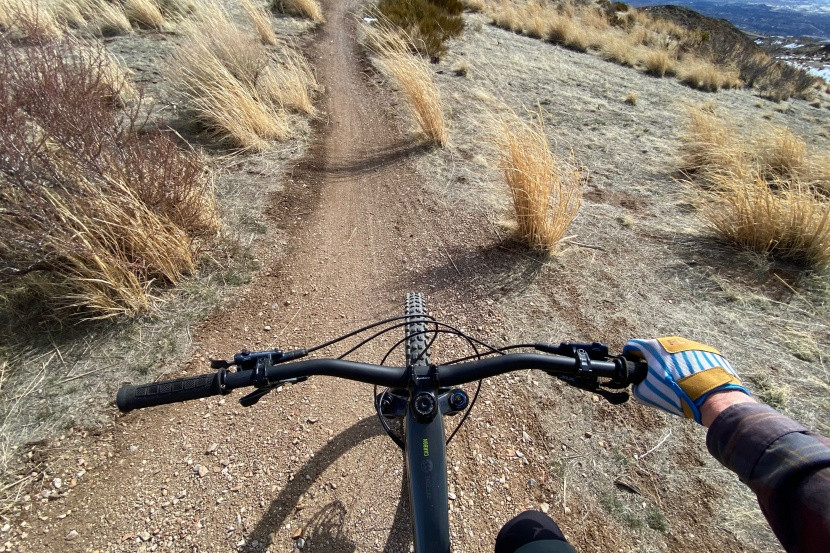 SQlab 30X 12-Degree Carbon handlebar designed for ergonomic comfort
SQlab 30X 12-Degree Carbon handlebar designed for ergonomic comfort
The SQlab 30X 12-Degree Carbon handlebar is designed to alleviate wrist discomfort with its enhanced backsweep.
Race Face Next R 35 Carbon: Best for Lightweight
 Race Face Next R 35 Carbon mountain bike handlebar
Race Face Next R 35 Carbon mountain bike handlebar
Price: $127 at Amazon, $180 at REI
Weight: 215 grams | Clamp Diameter: 35mm
Reasons to Buy:
- Exceptionally lightweight, ideal for weight-conscious riders
- Stiff and responsive for precise handling and control
- Available in three rise options and six color choices for customization
Reasons to Avoid:
- Higher price point compared to aluminum handlebars
- Vibration dampening slightly less pronounced than top competitors
Race Face is a prominent name in mountain bike components, and their Next R 35 Carbon handlebar lives up to their reputation, topping our charts as the lightest handlebar in our test. At a mere 215 grams, the Next R 35 Carbon is a prime choice for riders seeking to minimize bike weight. Despite its feathery weight, the 35mm clamp diameter ensures a stiff stem interface, and the Next R delivers excellent leverage and control. It effectively dampens high-frequency vibrations, contributing to hand comfort during longer rides. Crafted with a uni-directional carbon layup, it features an 800mm width, 8 degrees of backsweep, and 5 degrees of upsweep. Race Face offers the Next R in 10mm, 20mm, and 35mm rise options, allowing riders to fine-tune their bike fit. The matte clear coat finish adds a touch of class, and six logo color options provide customization possibilities.
While the Next R handlebar excels in lightweight performance, its vibration absorption is slightly less pronounced compared to top-rated bars like the Deity Speedway Carbon. It also represents a higher investment, reflecting its premium lightweight construction. However, for riders prioritizing weight reduction without compromising control, the Next R is an outstanding option. If vibration damping is a primary concern, the Deity Speedway Carbon remains our top recommendation.
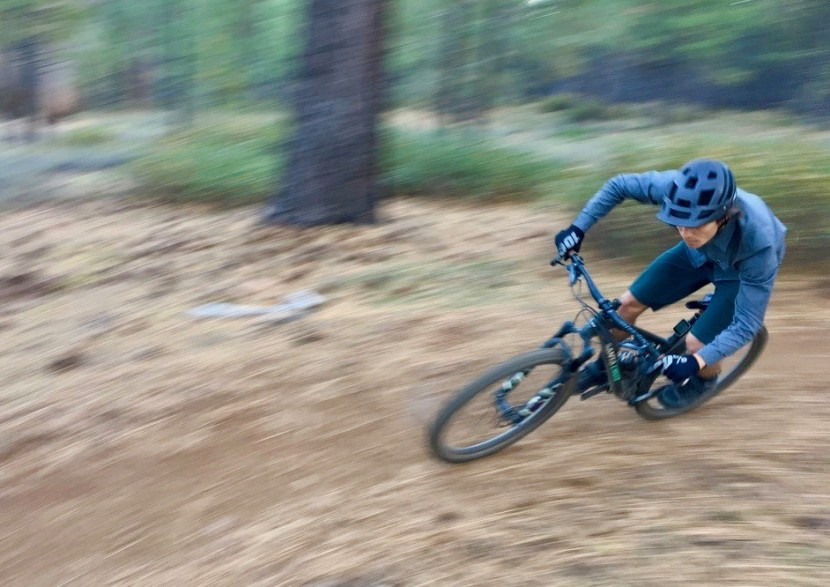 Race Face Next R 35 Carbon handlebar, the lightest option in our test
Race Face Next R 35 Carbon handlebar, the lightest option in our test
The Race Face Next R 35 Carbon handlebar is an excellent lightweight upgrade for any mountain bike discipline.
Ibis Carbon Adjustable Width: Best for Adjustability
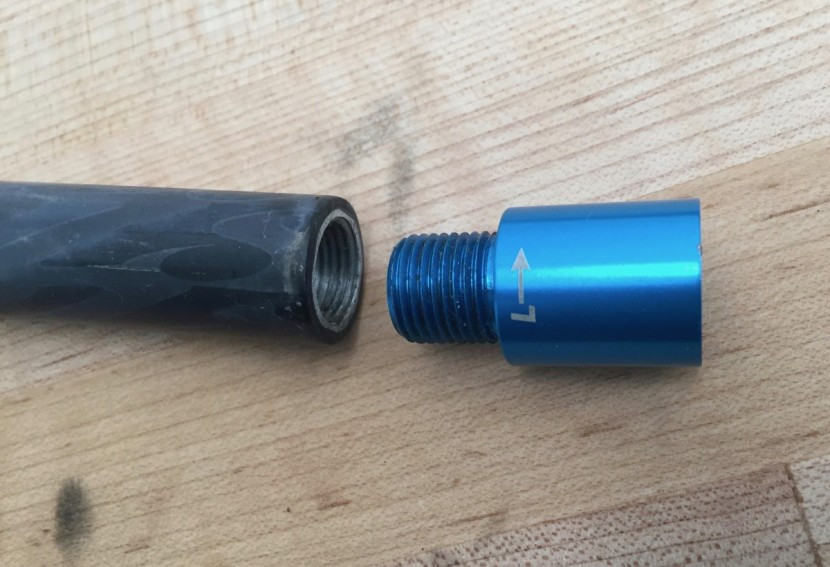 Ibis Carbon Adjustable Width mountain bike handlebar
Ibis Carbon Adjustable Width mountain bike handlebar
Price: See It at Ibis Cycles
Weight: 254 grams | Clamp Diameter: 31.8mm
Reasons to Buy:
- Unique adjustable width feature for customized setup
- Lightweight construction for enhanced performance
- Comfortable ride feel with effective vibration damping
Reasons to Avoid:
- Higher price point reflecting its innovative design
- Not as stiff as some carbon handlebar competitors
The Ibis Carbon Adjustable Width handlebar stands out with its innovative design, allowing riders to fine-tune handlebar width for experimentation or to suit varying trail conditions. By incorporating threaded aluminum inserts at the handlebar ends, Ibis enables width adjustments between 750mm and 800mm. These aluminum inserts can also be trimmed for intermediate widths, and replacement inserts are available for purchase, facilitating width experimentation without permanent modification. Beyond its adjustability, the Ibis handlebar is competitively lightweight and delivers a comfortable ride feel with good control and vibration damping.
The Adjustable Width handlebar offers ample control in most riding situations, but it exhibits slightly less stiffness compared to other carbon handlebars in our test. This subtle difference may be noticeable in aggressive terrain where ultimate steering precision is paramount. It is also exclusively available in a 31.8mm clamp diameter, potentially requiring a stem change for bikes with 35mm stems. Despite these minor points, the Ibis Adjustable Width handlebar is a compelling option for riders who value customization and comfort. For riders prioritizing maximum stiffness and control, the ENVE M7 is a stiffer alternative.
 Ibis Carbon Adjustable Width mountain bike handlebar
Ibis Carbon Adjustable Width mountain bike handlebar
The Ibis Carbon Adjustable Width handlebar allows riders to customize their handlebar width between 750mm and 800mm.
ENVE M7: Best for Stiffness
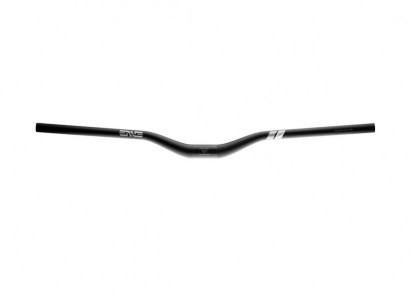 ENVE M7 carbon mountain bike handlebar
ENVE M7 carbon mountain bike handlebar
Price: $190 at REI, $190 at Backcountry
Weight: 241 grams | Clamp Diameter: 35mm
Reasons to Buy:
- Lightweight carbon construction for performance
- Exceptionally stiff and precise for maximum control
- Proudly made in the USA
Reasons to Avoid:
- Premium price point reflecting its high-end construction
- Stiffness may be excessive for riders seeking more compliance
- Less forgiving than more compliant carbon handlebars
ENVE Composites is a renowned manufacturer of high-end cycling components, notable for their US-based carbon fiber production. Their ENVE M7 handlebar is engineered for aggressive trail, enduro, and downhill riders demanding uncompromising stiffness and control. If razor-sharp steering and immediate response are your priorities, the M7 is an ideal match. This carbon handlebar delivers ultra-precise handling and feedback, enhancing rider input and control. It features a comfortable 8mm backsweep and 4mm upsweep, and is available in 10mm, 25mm, and 40mm rise options to suit diverse rider preferences. The M7 boasts ENVE’s signature impeccable finish and build quality, and includes decal sheets for customization to match ENVE wheels or other components.
The ENVE M7 stands out as one of the stiffest handlebars we tested, providing exceptional control. However, its stiffness comes at the expense of vibration damping, which is less pronounced compared to top-rated handlebars like the Deity Speedway Carbon. Our testers found the M7 to feel less compliant and somewhat harsh, potentially leading to hand fatigue on extended descents. Despite this, for riders who prioritize stiffness and steering precision above all else, the M7 is an exceptional choice.
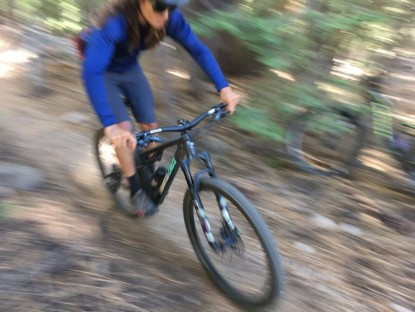 ENVE M7 handlebar engineered for maximum stiffness and control
ENVE M7 handlebar engineered for maximum stiffness and control
The ENVE M7 handlebar is built for aggressive riders seeking ultimate stiffness and precise control in demanding terrain.
Spank Oozy Trail 780 Vibrocore: Best Alloy Handlebar for Vibration Dampening
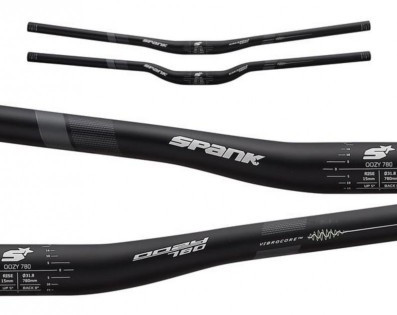 Spank Oozy Trail 780 Vibrocore aluminum mountain bike handlebar
Spank Oozy Trail 780 Vibrocore aluminum mountain bike handlebar
Price: $100 at Amazon, $115 at REI
Weight: 278 grams | Clamp Diameter: 31.8mm
Reasons to Buy:
- Lightweight for an aluminum handlebar
- Vibrocore technology for enhanced vibration dampening
- Available in five color options for customization
Reasons to Avoid:
- Higher price point compared to other aluminum handlebars
- Steering precision slightly less sharp than stiffer models
Spank Industries specializes in bike components, and their Oozy Trail 780 Vibrocore handlebar stands out as a lightweight aluminum model incorporating their unique Vibrocore technology. This technology involves filling the handlebar with foam inserts designed to reduce high-frequency vibrations and trail feedback, enhancing rider comfort. Despite the Vibrocore foam, the Oozy Trail remains the lightest aluminum handlebar in our test, weighing in at 278 grams for the 25mm rise version. The 780mm width is well-suited for trail riding, and trimming marks allow for width customization. It features a 5-degree upsweep, a 7-degree backsweep, and is available in 15mm and 25mm rise options. The handlebar is shot-peened for increased durability and finished with black anodizing and five logo color options.
While the Oozy Trail 780 Vibrocore excels in comfort thanks to its Vibrocore technology, this compliance slightly compromises steering precision compared to stiffer handlebars. Handling remains controlled, but it lacks the razor-sharp feel of ultra-stiff models. It is priced higher than some aluminum handlebars, but still significantly more affordable than carbon options. For riders prioritizing vibration damping and hand comfort at a non-carbon price, the Oozy Trail is an excellent choice. The SQlab 30X Carbon offers a blend of comfort and precision in a carbon construction.
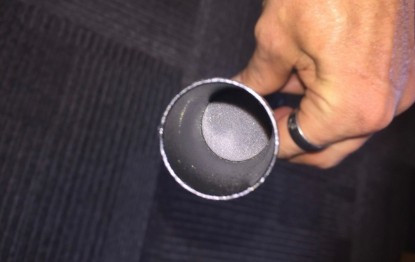 Spank Oozy Trail 780 Vibrocore handlebar with Vibrocore foam insert
Spank Oozy Trail 780 Vibrocore handlebar with Vibrocore foam insert
The Spank Oozy Trail 780 Vibrocore handlebar utilizes Vibrocore foam to dampen vibrations and enhance rider comfort.
Deity Components Blacklabel 800: Best Burly Aluminum Handlebar
Price: $84 at Backcountry
Weight: 340 grams | Clamp Diameter: 31.8mm
Reasons to Buy:
- Extremely stiff and responsive for aggressive riding
- Reasonable price point for a high-performance aluminum handlebar
- Sleek aesthetics with multiple color options
Reasons to Avoid:
- Heaviest handlebar in our test group
- Stiffness may be excessive for riders seeking more compliance
- Limited vibration dampening
The Deity Blacklabel 800 is a robust aluminum handlebar engineered for aggressive downhill riding. This handlebar has proven its mettle on World Cup DH tracks, Crankworx courses, and Red Bull Rampage under professional riders. The Blacklabel 800 is exceptionally stiff, even in a 31.8mm clamp diameter, making it one of the burliest handlebars in our test. Steering and handling are incredibly precise and responsive, providing instant feedback to rider input. The 800mm width offers ample leverage for high-speed maneuvers and aggressive cornering. Its geometry, featuring a comfortable 9-degree backsweep and 5-degree upsweep, is offered in 15mm, 25mm, and 38mm rise options. The Blacklabel 800 features a black anodized finish and is available in eight logo color options.
Due to its extreme stiffness, the Blacklabel 800 is also among the least forgiving handlebars in our test. Its stiffness can contribute to hand fatigue, particularly on longer rides. At 340 grams, it is the heaviest handlebar in our review. While weight may not be a primary concern for gravity-focused riders, it’s a consideration for trail riding. However, for riders who prioritize maximum stiffness and responsiveness for aggressive riding, the Blacklabel 800 is an ideal choice. For riders seeking comfort and weight reduction, the Santa Cruz Carbon Riser is a more compliant and lighter alternative.
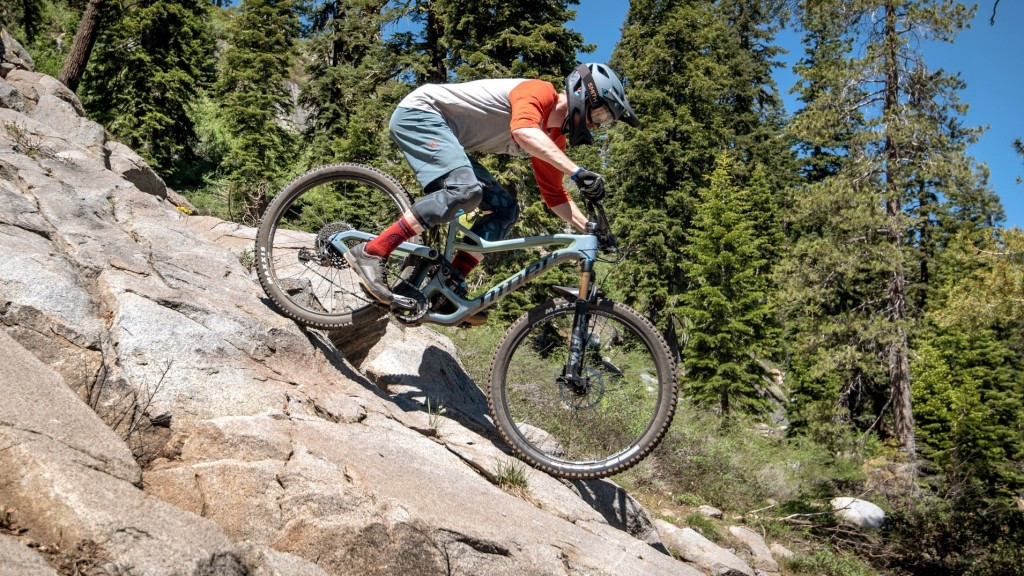 Deity Components Blacklabel 800 handlebar, built for aggressive downhill riding
Deity Components Blacklabel 800 handlebar, built for aggressive downhill riding
Upgrading your mountain bike handlebars, regardless of riding style, can significantly enhance your bike’s performance.
Why Trust GearLab
Joshua Hutchens, GearLab’s Senior Bicycle Editor, brings a lifetime of cycling passion and expertise to our handlebar testing. With experience as a professional guide, racer across various disciplines, bike shop owner, indoor bike park operator, and consultant to leading cycling brands, Joshua’s nuanced understanding of bike components is unparalleled. His deep-rooted passion for trails and mountain biking, dating back to his first mountain bike in 1986, informs his meticulous and insightful reviews.
Jeremy Benson, a professional racer and seasoned mountain bike reviewer, joined Joshua in this handlebar test. Jeremy’s extensive product testing experience in both the ski and mountain bike industries, combined with his obsessive riding and racing habits, ensures rigorous and insightful evaluation. He is acutely attuned to subtle performance differences and demands high performance from his gear.
For consistent and familiar testing conditions, all handlebars were installed on our testers’ personal bikes. We subjected each handlebar to hundreds of miles of riding, focusing on key performance attributes including stiffness, vibration damping, control, and geometry. Our comprehensive testing process aims to provide you with the most thorough and reliable assessment of each handlebar’s capabilities.
Prior to on-trail testing, we meticulously examined each handlebar’s geometry, construction, features, and weight to gain a comprehensive understanding of its design and intended performance.
 GearLab testing mountain bike components on challenging trails
GearLab testing mountain bike components on challenging trails
Rigorous on-trail testing is crucial for evaluating mountain bike component performance.
We dedicated extensive hours to testing each handlebar in real-world riding conditions to provide accurate and reliable reviews.
What’s the Best Value?
Whether you’re investing in a new high-end bike or upgrading a trusted steed, your mountain bike represents a significant investment. Upgrading components like handlebars offers a cost-effective way to improve comfort and performance. Our handlebar tests revealed a wide price range, with aluminum models generally more affordable than carbon fiber counterparts. However, the OneUp Carbon Handlebar stood out for its exceptional performance relative to its price, offering impressive carbon fiber benefits at a competitive value. The Funn Full-On also impressed as a budget-friendly option, delivering solid performance at a fraction of the cost of other tested handlebars.
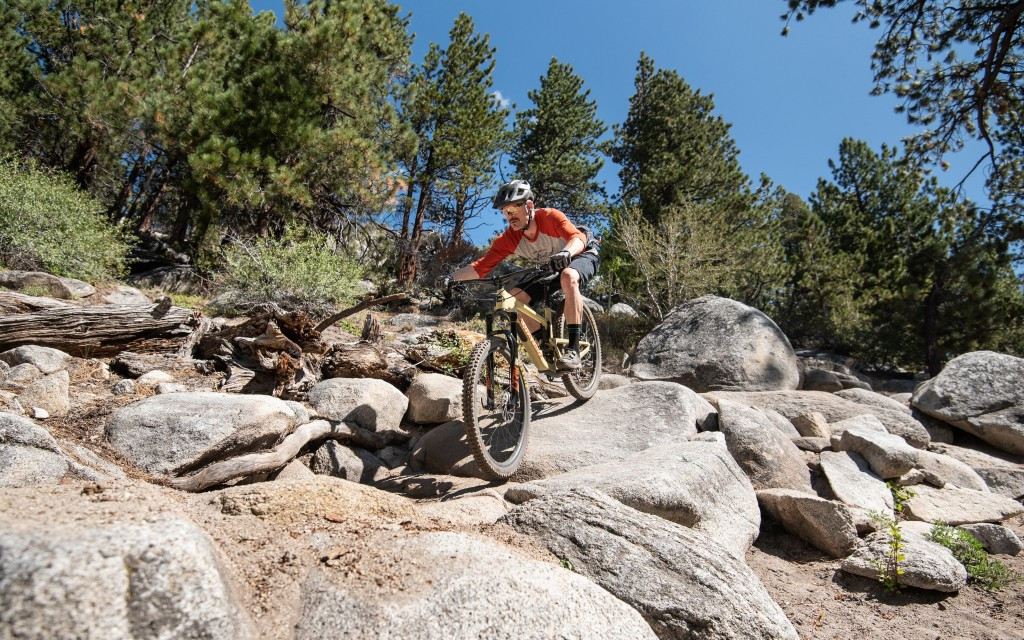 Mountain bike handlebar upgrade for enhanced comfort and control
Mountain bike handlebar upgrade for enhanced comfort and control
The mountain bike handlebar is an often underestimated component; selecting the right one significantly improves comfort and control.
Why Upgrade Your Mountain Bike Handlebar?
When purchasing a new mountain bike, attention often focuses on the frame and suspension quality. However, a bike’s performance is the sum of its parts, and handlebars are frequently overlooked by both manufacturers and consumers. Stock handlebars on new bikes, regardless of price point, are typically functional but basic. Original Equipment (OE) handlebars are often sourced from house brands or affiliates as a cost-saving measure.
Many riders are unaware of the significant variations in handlebar shapes, sizes, sweeps, materials, and their resulting impact on control, comfort, and on-trail performance. While your bike frame might fit well, handlebar geometry, rise, and sweep can further refine your riding position and comfort. Upgrading handlebar width and clamp diameter can enhance control, while different materials and constructions offer varying levels of vibration damping, stiffness, and compliance, reducing hand fatigue and improving handling. While stock handlebars are functional, upgrading allows for personalized fit, comfort, and performance optimization.
Handlebar Considerations
Upgrading or replacing your mountain bike handlebars involves considering several key factors. Understanding handlebar performance, shape, size, and construction is crucial for making an informed decision.
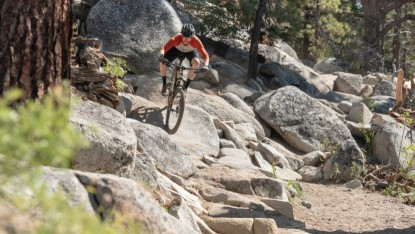 Modern wider mountain bike handlebars for improved control
Modern wider mountain bike handlebars for improved control
Handlebar widths have increased in recent years to complement modern bike geometry and aggressive riding styles.
Width
Handlebar width preferences have evolved alongside bike geometry. As bikes become longer, slacker, and more capable, handlebar widths have increased to match. Wider handlebars offer enhanced leverage and control compared to narrower bars, promoting a more forward and “attacking” riding position. This position improves stability on longer, slacker bikes, particularly in corners, jumps, and steep terrain. Wider handlebars also increase leverage for manipulating the front end, reducing the effort needed for steering and bike control. However, excessively wide handlebars can negatively impact comfort and control.
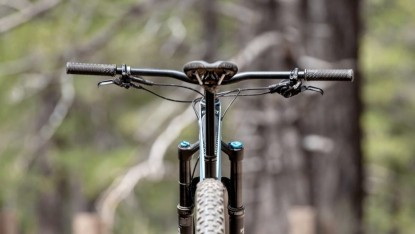 Handlebar width is a key factor in mountain bike handling
Handlebar width is a key factor in mountain bike handling
Handlebar width is a personal preference; modern trail and all-mountain bikes often feature 780-800mm bars, which can be trimmed to suit individual needs.
To determine optimal handlebar width, simulate a riding position while standing, close your eyes, and naturally position your hands as if gripping handlebars. Measure the distance between your hands to gauge your natural hand position. If your current handlebar feels too narrow or wide, it likely is. While width cannot be added to narrow bars, wider bars can be trimmed. Generally, DH and enduro riders prefer 780-800mm widths for men and 740-780mm for women, while trail and XC riders often opt for slightly narrower 750-780mm widths.
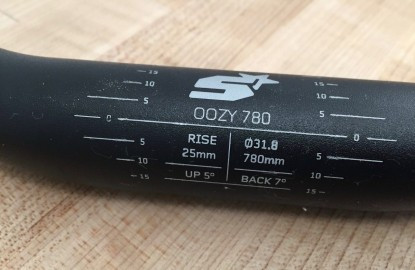 Variety of mountain bike handlebar shapes and sizes
Variety of mountain bike handlebar shapes and sizes
Mountain bike handlebars are available in various widths, upsweep, backsweep, rise, and clamp diameters to suit different riding styles and preferences.
Geometry
Handlebar geometry encompasses rise and sweep (upsweep and backsweep). Upsweep provides a slight rise for a more neutral wrist position, while backsweep angles bar ends towards the rider for wrist comfort. Most handlebars feature 8-10 degrees backsweep and 4-6 degrees upsweep. The SQlab 30X handlebar is an exception, offering 12 or 16 degrees of backsweep for enhanced ergonomics. Optimal sweep is subjective and comfort-driven. If your current handlebar sweep is comfortable, it’s a good starting point for choosing a new one.
Rise, also a personal preference, influences rider body position. Higher rise bars (20-40mm) are common on trail, enduro, and DH bikes, promoting a more upright position with centered weight distribution. Some riders prefer this upright posture, and handlebar rise can help achieve it. Flat or low-rise bars encourage a more forward, aggressive position with more weight over the front wheel, typical of XC and light trail bikes. Riding style and personal preference dictate the ideal handlebar rise.
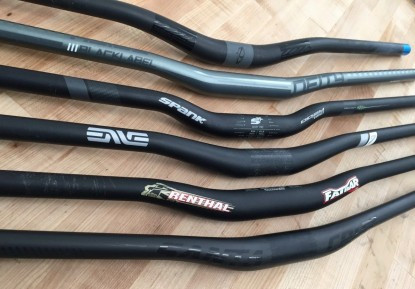 Carbon fiber and aluminum mountain bike handlebar materials
Carbon fiber and aluminum mountain bike handlebar materials
Mountain bike handlebars are primarily made of carbon fiber or aluminum, each offering distinct performance characteristics, weight, and price points.
Materials
The aluminum vs. carbon fiber debate is ongoing in cycling. Both materials have proven successful in racing, highlighting that rider skill is paramount. However, carbon fiber offers notable differences in weight, feel, and price compared to aluminum.
Carbon Fiber
Carbon fiber handlebars are typically twice the price of aluminum models. This premium price delivers significant weight reduction, with carbon bars often 50-100 grams lighter than comparable aluminum bars. Carbon fiber also offers enhanced vibration reduction and stiffness. Engineers can manipulate carbon fiber layup and shape for specific performance characteristics.
Aluminum
Aluminum, or alloy, is a more affordable and easily manipulated material. Aluminum handlebars are typically half the price of carbon counterparts, with a corresponding weight penalty. Aluminum bars are available in diverse shapes and sizes, though design flexibility is slightly limited compared to carbon. Aluminum can be made stiff, but balancing stiffness and vibration damping to match carbon is challenging.
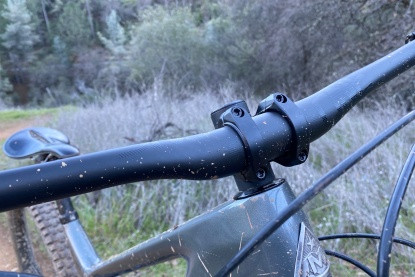 35mm clamp diameter mountain bike handlebar for increased stiffness
35mm clamp diameter mountain bike handlebar for increased stiffness
The larger 35mm clamp diameter creates a stiffer stem/bar interface, offering advantages for aggressive riding.
Clamp Diameter
Clamp diameter, or bore size, refers to the handlebar width at the stem clamp, tapering towards the grips. Historically, 31.8mm was the standard clamp diameter. 35mm clamp diameters emerged on DH bikes for increased stiffness at the stem/bar interface. Recent advancements have brought 35mm handlebars to trail and enduro riding, offering stiffness comparable to older 31.8mm standards with improved durability and varied performance characteristics.
There is no universally “correct” clamp diameter. Modern trail and enduro bikes often feature 35mm stems and bars, while XC and trail bikes commonly use 31.8mm. 35mm is generally favored for aggressive, stiffer riding, while 31.8mm may offer slightly more compliance and comfort. Switching clamp diameters requires stem replacement.
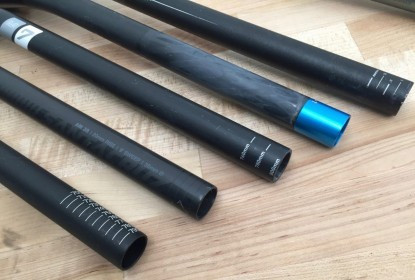 Handlebar trimming guides for width adjustment
Handlebar trimming guides for width adjustment
Most manufacturers include measurement lines for trimming handlebars to the desired width. Adjustable width handlebars, like the Ibis model, offer greater customization.
Adjustability
All handlebars are width-adjustable by trimming the ends, a permanent, one-way process. Most handlebars include trimming guides in 10mm increments. It’s advisable to start with a wider bar and trim to the desired width.
Ibis offers the Adjustable Width Carbon handlebar with removable threaded aluminum inserts. This allows switching between 800mm (with inserts) and 750mm (without), and intermediate widths by trimming the inserts. This niche feature caters to racers and riders experimenting with width.
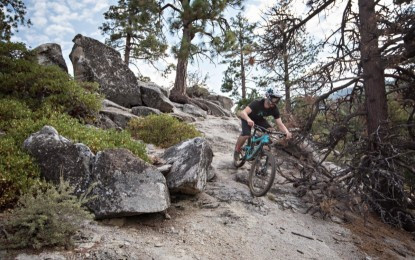 Balancing stiffness and compliance for optimal handlebar performance
Balancing stiffness and compliance for optimal handlebar performance
Demanding terrain requires handlebars that offer both precise handling and vibration damping for hand comfort.
Stiffness, Compliance, & Control
Stiffness and compliance are inversely related. Compliance is a material’s elasticity, or deformation under force, while stiffness is its resistance to deformation. Handlebars are tapered to create sections with varying stiffness and compliance. These sections combine to determine vibration absorption, flex under force, and steering accuracy. Some riders prioritize stiffness for maximum control, while others prefer compliance for vibration damping and reduced hand fatigue. Ideally, handlebars balance both.
The Deity Speedway 35 Carbon, OneUp Carbon, and Santa Cruz Carbon Riser excel in balancing stiffness and compliance, effectively damping vibrations and reducing hand fatigue while maintaining steering precision. These bars share similar 20-30mm rises and 35mm clamp diameters, often associated with enhanced downhill control. The Race Face Next R closely follows in this category.
 Santa Cruz Carbon Riser handlebar praised for stiffness and compliance balance
Santa Cruz Carbon Riser handlebar praised for stiffness and compliance balance
The Santa Cruz Carbon Riser handlebar provides an excellent balance of stiffness and compliance, making it a favorite among testers.
The Renthal Fatbar 35, SQlab 30X Carbon, and Ibis Adjustable Width offer moderate stiffness and compliance. The 31.8mm clamp diameter Ibis and SQlab bars are more compliant for carbon, feeling slightly less stout than 35mm options in rough terrain. The Fatbar offers good control but less vibration damping and steering precision than top carbon models.
Very stiff options, like the Deity Blacklabel 800 and Enve M7, offer exceptional handling precision, but their lack of compliance can cause hand fatigue, reducing overall control in the long run. Conversely, the Spank Oozy Vibrocore is highly compliant but less stiff, absorbing vibrations but feeling less responsive to steering input, especially at higher speeds.
 Lightweight mountain bike handlebar for improved performance
Lightweight mountain bike handlebar for improved performance
Handlebar weight is a consideration for performance; lighter handlebars can improve bike agility and handling.
Weight
Lighter is generally preferred in mountain biking. Handlebar weight is a significant area for potential weight savings. Carbon fiber handlebars are consistently lighter than aluminum, often by 100 grams or more. However, carbon fiber is more expensive.
The Race Face Next R is the lightest at 215 grams. The OneUp Carbon is the next lightest at 223 grams, followed by the Santa Cruz Carbon Riser at 227 grams. The Enve M7, Deity Speedway, and SQlab 30X Carbon are also lightweight carbon options. The Ibis Adjustable weighs 254g with inserts (800mm) and 236g without (750mm).
Aluminum handlebars are heavier. The Spank Oozy Vibrocore 780 is the lightest aluminum bar at 278g, impressive given its Vibrocore foam. The Renthal Fatbar weighs 311g, and the downhill-oriented Deity Blacklabel is the heaviest at 340g. The budget-friendly Funn Full-On is slightly lighter at 335 grams.
 Mountain bike handlebar style and design considerations
Mountain bike handlebar style and design considerations
Style and design are subjective; subtle and stealthy looks are often preferred, as exemplified by the SQlab 30X handlebar.
Style & Design
Beyond performance, handlebar style and design are important considerations. This encompasses product quality, attention to detail, unique features, and available geometry and color options.
The Ibis Adjustable Width handlebar excels in design innovation with its adjustable width feature. The Spank Oozy Vibrocore stands out for incorporating vibration-damping foam into an aluminum handlebar. The OneUp Carbon Handlebar is recognized for its clean aesthetics and unique ovalized design enhancing comfort in a 35mm carbon model.
 Upgrading mountain bike handlebars for enhanced performance and comfort
Upgrading mountain bike handlebars for enhanced performance and comfort
A handlebar upgrade is a worthwhile investment for improving both the comfort and performance of your mountain bike.
Conclusion
While often overlooked, mountain bike handlebars are a crucial component impacting comfort and performance. Choosing the right handlebar can significantly enhance your riding experience. By considering factors like material, width, geometry, and stiffness, you can personalize your bike and unlock its full potential on the trails. This guide provides the information needed to make an informed decision and find the perfect mountain bike handlebar for your riding needs.

